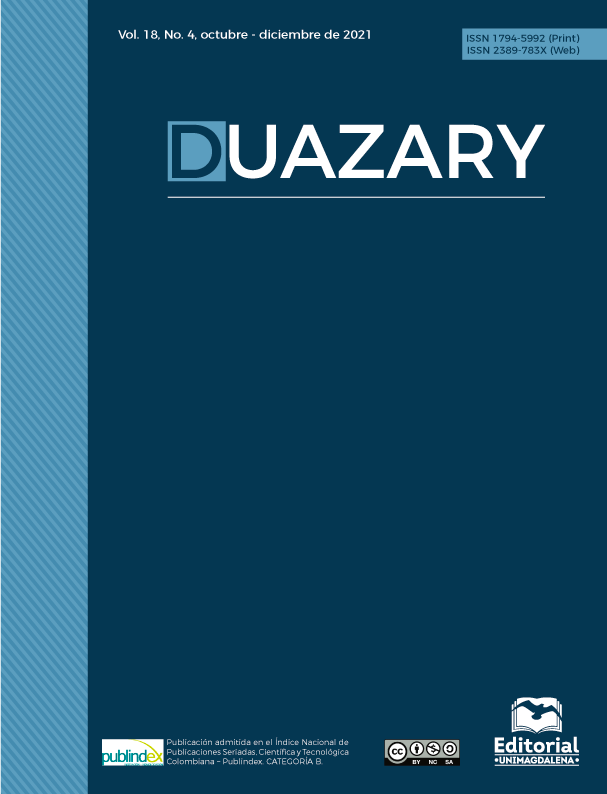Estrategias de enseñanza y atención de la salud bucal en pacientes con discapacidad auditiva
Contenido principal del artículo
Resumen
Descargas
Detalles del artículo

Esta obra está bajo una licencia internacional Creative Commons Atribución-NoComercial-CompartirIgual 4.0.
No se permite un uso comercial de la obra original ni de las posibles obras derivadas, la distribución de las cuales se debe hacer con una licencia igual a la que regula la obra original.
Citas
Organización Mundial de la Salud (OMS). Deafness and Hearing Loss; 2018. Disponible en: https://www.who.int/news-room/fact-sheets/detail/deafness-and-hearing-loss
Vos T, Allen C, Arora M, Barber RM, Bhutta ZA, Brown A, et al. Global, regional, and national incidence, prevalence, and years lived with disability for 310 diseases and injuries, 1990–2015: a systematic analysis for the Global Burden of Disease Study 2015. Lancet 2016;388(10053):1545–602. Disponible en: https://linkinghub.elsevier.com/retrieve/pii/S0140673616316786
Sharby N, Martire K, Iversen M. Decreasing Health Disparities for People with Disabilities through Improved Communication Strategies and Awareness. Int J Environ Res Public Health 2015;12(3):3301–16. Disponible en: http://www.mdpi.com/1660-4601/12/3/3301
McKee MM, Paasche-Orlow MK, Winters PC, Fiscella K, Zazove P, Sen A, et al. Assessing Health Literacy in Deaf American Sign Language Users. J Health Commun 20(sup2):92–100. Doi: https://doi.org/10.1080/10810730.2015.1066468
Malebranche M, Morisod K, Bodenmann P. Deaf culture and health care. Can Med Assoc J. 2020;192(50):E1809–E1809. Doi: https://doi.org/10.1503/cmaj.200772
Vichayanrat T, Kositpumivate W. Oral health conditions and behaviors among hearing impaired and normal hearing college students at Ratchasuda College, Nakhon Pathom, Thailand. Southeast Asian J Trop Med Public Health [Internet]. 2014;45(5):1228–35. Disponible en: https://pubmed.ncbi.nlm.nih.gov/25417527/
Emond A, Ridd M, Sutherland H, Allsop L, Alexander A, Kyle J. Access to primary care affects the health of Deaf people. Br J Gen Pract [Internet]. febrero de 2015;65(631):95–6. Doi: https://doi.org/10.3399/bjgp15X683629
Jnaneswar A, Subramaniya G, Pathi J, Jha K, Suresan V, Kumar G. Assessment of dental caries and periodontal status in institutionalized hearing impaired children in Khordha District of Odisha. J Indian Soc Pedod Prev Dent 2017;35(3):203. Disponible en: http://www.jisppd.com/text.asp?2017/35/3/203/211836
Shetty V, Kumar J, Hegde A. Breaking the sound barrier: oral health education for children with hearing impairment. Spec Care Dent 2014;34(3):131–7. Doi: https://doi.org/10.1111/scd.12042
Lees A, Rock WP. A Comparison Between Written, Verbal, and Videotape Oral Hygiene Instruction for Patients with Fixed Appliances. J Orthod 2000;27(4):323–8. Doi: https://doi.org/10.1093/ortho/27.4.323
Baliga Ms, Deshpande M, Thosar N, Rathi N, Bane S, Deulkar P. Comparison of impact of oral hygiene instructions given via sign language and validated customized oral health education skit video on oral hygiene status of children with hearing impairment. J Indian Soc Pedod Prev Dent 2020;38(1):20. Disponible en: http://www.jisppd.com/text.asp?2020/38/1/20/280518
Campos V, Cartes-Velásquez R, Bancalari C. Development of an app for the dental care of Deaf people: Odontoseñas. Univers Access Inf Soc 2020;19(2):451–9. Disponible en: http://link.springer.com/10.1007/s10209-018-0637-1
Pérez-Baquero BM, Sánchez-Alfaro LA, Grandas-Ramírez ÁL. Dentiseñas–Colombia, prototipo de una App para facilitar la comunicación Odontólogo– Persona con Discapacidad Auditiva. CES Odontol 2020;33(2):49–61. Disponible en: https://revistas.ces.edu.co:443/index.php/odontologia/article/view/6045

